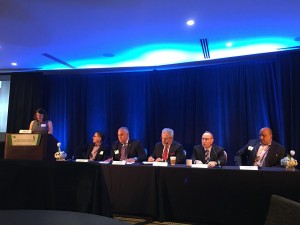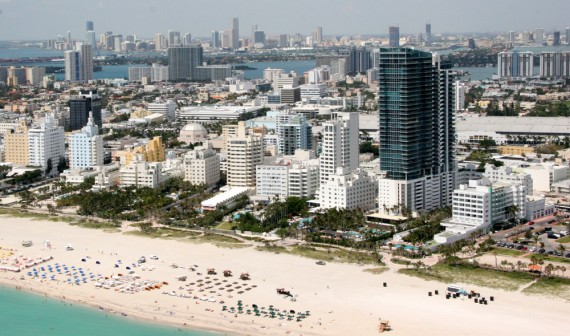Miami’s hotel industry, vital to the region’s tourism economy, is under attack from Airbnb, and hotel owners need to band together to lobby against short-term rentals, developer Russell Galbut and other business leaders said during a panel Tuesday held at the Shelborne Wyndham Grand South Beach.

Moderator Peggy Benua, Robert Finvarb, Jimmy Morales, Russell Galbut, Jeffrey Margolis and Jaime Escobar
The event, “How Illegal Short Term Rentals are Affecting Our Hotel Industry,” also included panelists Jimmy Morales, Miami Beach city manager; Robert Finvarb, founder of Robert Finvarb Companies; Jeffrey R. Margolis, attorney at Berger Singerman; and Jaime Escobar, general manager of the Stiles Hotel.
There are roughly 3,900 Airbnb listings in Miami Beach alone. Earlier this year, The Real Deal took a look at Airbnb’s political fights around there world, where cities like New York and San Francisco have fought the short-term rental company head on. In April, Newark agreed to legalize and tax the company with a 6 percent tax – marking the second city to do so in New Jersey.
Legislation passed in Florida in 2011 prohibits local governments from regulating and restricting vacation rentals. In cities like Miami Beach and West Palm Beach, where legislation banning vacation rentals in certain areas existed prior to the statute, those regulations stand. Now, Margolis said, local governments in Florida can regulate those rentals but can’t prohibit but not the duration or frequency of the rentals.
“The question is enforcement. How do you enforce? It relies a lot on the neighbors and the hotels to bring it to the attention of the local governments when there are illegal rentals taking place,” Margolis said. “The vacation rentals need to become a legitimate part of the hospitality industry.”
For this fiscal year, the city has recorded 400 “investigations” related to illegal short-term rentals, according to Morales. The city has two dedicated code enforcement officers who work on short-term rental violations. “Clearly, keeping up with thousands and thousands of units is difficult,” he said.
Morales said home-sharing websites like Airbnb could also impact the workforce and the availability of affordable housing in Miami Beach. “It used to be more of a quality of life issue,” he said. “Now it’s grown to an economic issue as well.”
Among the results: the loss of as much as tens of millions of dollars in hotel taxes, he said.
In New York City, the average hotel room rate fell for the first time in years, with some hoteliers blaming short-term rental services like Airbnb. And while the price of a night fell 1.7 percent, tourism is on the rise. The same is happening in Miami and Miami Beach, panelists said.
“I take the position that our hotel industry is under attack,” Galbut, CEO of Crescent Heights, said during the panel, which was held by the Greater Miami and the Beaches Hotel Association and moderated by Peggy Benua, general manager of Dream South Beach. Galbut said Airbnb, which he said was valued at $3.5 billion in the United States, is a disruptive technology. He called for the hotel community to band together and lobby against the short-term rental industry.
“Every one of our hotels is down [in occupancy] this year from last,” Galbut said. “Traffic is up.”
With an increase in single-family homes and condos being rented on a short-term basis, Finvarb said there has been a substantial diminishment in demand for hotel rooms. He called for condo associations – and condo owners – to get more active, citing units that are being subleased “unbeknown to the owner.”
“As an industry, we’re still somewhat in denial,” he said. “We have to figure out how to live with them.”
